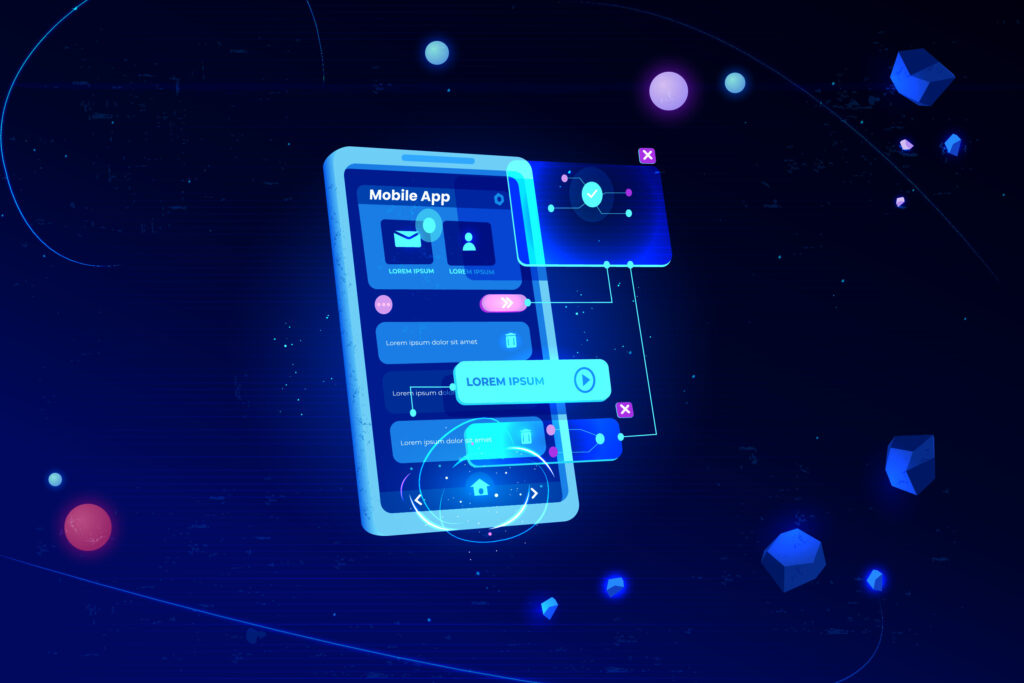
The Future of Mobile App Development: Key Trends Shaping What’s Next
The world of mobile app development is moving at lightning speed. With smartphone usage at an all-time high, businesses are under constant pressure to create smarter, faster, and more intuitive mobile experiences. In Dubai and across the globe, mobile apps have become a vital part of daily life—from managing finances to ordering dinner, or even attending virtual doctor appointments.
At Arabinfotech, we keep our fingers on the pulse of what’s next. Let’s explore the key trends and technologies shaping the future of mobile app development and how businesses can harness them to stay competitive.

Game-Changing Technologies Shaping Tomorrow’s Mobile Apps
- AI & Machine Learning Are Transforming App Intelligence
Artificial Intelligence (AI) and Machine Learning (ML) are no longer buzzwords—they’re central to how modern apps work. Think smart recommendations, voice assistants, and predictive features that learn your behavior to deliver tailored experiences.
From AI-driven chatbots offering real-time support to facial recognition features for secure access, these technologies are making apps more responsive, personalized, and secure.
- AR and VR Move Beyond Gaming
Augmented Reality (AR) and Virtual Reality (VR) are expanding into industries like education, real estate, healthcare, and retail. Imagine trying on clothes virtually, exploring properties remotely, or conducting immersive training sessions—all from your smartphone.
As AR/VR hardware becomes more accessible, expect these technologies to become standard features in future mobile apps.
- 5G: Fueling a New Era of App Performance
With the rollout of 5G networks in Dubai and beyond, mobile applications are becoming faster, more reliable, and more capable. Ultra-low latency and blazing-fast speeds enable powerful experiences like cloud gaming, HD video streaming, and even remote surgeries.
For developers, 5G opens the door to build more complex, data-heavy apps without compromising on performance.
- Blockchain and Decentralized Apps (DApps)
Security is paramount—and blockchain is stepping up. Decentralized apps, or DApps, operate on blockchain networks, making them more secure and transparent. Whether it’s for secure transactions, supply chain tracking, or digital identity verification, blockchain-powered apps are gaining ground across industries.
- No-Code and Low-Code Platforms Make Development Accessible
The rise of no-code and low-code tools has made it easier than ever to build apps without deep coding knowledge. These platforms offer drag-and-drop builders and pre-made modules, allowing startups and entrepreneurs to launch products quickly and affordably.
As these tools evolve, expect to see more robust and feature-rich apps developed with minimal technical input.
The Rise of Super Apps: All-in-One Experiences
Consumers are growing tired of switching between multiple apps. Enter super apps—platforms that offer everything in one place. Think messaging, shopping, payments, and food delivery bundled together. Inspired by models like WeChat and Grab, super apps are gaining traction in the Middle East.
For businesses, it’s a golden opportunity to boost engagement and build long-term loyalty by offering integrated services under one roof.
Progressive Web Apps (PWAs) vs. Native Apps
PWAs offer a middle ground between mobile and web experiences. These apps run in browsers but behave like native mobile apps—fast, responsive, and even usable offline. They’re also cheaper and faster to build.
That said, native apps still hold the edge for high-performance needs, especially when tapping into device features like GPS, cameras, and sensors. The decision between the two comes down to your goals, budget, and desired functionality.
Security and Data Privacy: A Growing Priority
With regulations like GDPR and CCPA setting the tone, app developers are under more pressure than ever to protect user data. Users are also more aware of their privacy rights.
Mobile apps today are being built with stronger security measures like end-to-end encryption, two-factor authentication, and biometric logins. Many apps also use AI to detect and prevent suspicious activity in real-time.
For businesses in Dubai and beyond, earning user trust through secure app design is non-negotiable.
Eco-Friendly and Sustainable App Development
Sustainability is no longer just a buzzword. App developers are finding innovative ways to reduce environmental impact—by optimizing app performance, minimizing data usage, and encouraging paperless workflows.
Apps that promote green habits—like tracking carbon footprints or reducing energy usage—appeal to environmentally conscious users and position brands as forward-thinking.
What’s Next? Predictions for the Future of App Development
Here’s a sneak peek at where we believe mobile app development is headed:
- AI-Generated Apps
AI is not just helping build smarter apps—it might start building them too. Tools are already emerging that can generate app code, run real-time error checks, and even suggest improvements, cutting down development time and cost.
- Voice-First Interfaces
Voice-enabled experiences are becoming the norm, especially with the rise of smart assistants like Alexa, Google Assistant, and Siri. In the coming years, apps built around voice commands will be vital for hands-free navigation, smart homes, and accessibility.
- Quantum Computing (On the Horizon)
Still in its early stages, quantum computing has the potential to drastically enhance app processing capabilities. It will help power next-gen features in areas like AI, encryption, and scientific simulations—but its mainstream impact is still a few years out.
- Big Data and Hyper-Personalization
With access to more data, apps will become hyper-personalized. From tailored product recommendations to behavior-driven notifications, apps will anticipate what users need before they even ask.
- Edge Computing
Edge computing brings data processing closer to the user instead of relying solely on cloud servers. This reduces latency and improves performance, especially in applications like smart cities, autonomous vehicles, and real-time monitoring systems.
Final Thoughts: Innovate or Be Left Behind
Mobile app development is not just evolving—it’s accelerating. As technologies like AI, 5G, blockchain, and edge computing mature, businesses must adapt or risk falling behind.
At Arabinfotech, we specialize in building cutting-edge mobile applications that are secure, scalable, and future-ready. Whether you’re a startup or an enterprise, our Dubai-based team is here to bring your vision to life with innovative, customized app solutions.
Get in touch with us today to build your next-generation mobile app!